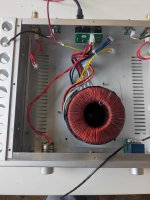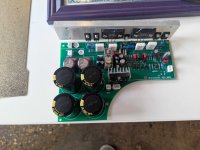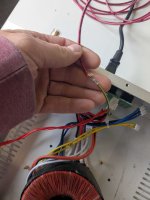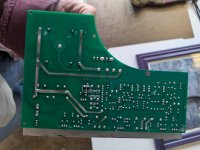I have this cheap little class AB amplifier. I am getting a hiss through any speaker I connect it to. Both channels. I'm thinking bad transformer but I will run through my troubleshooting steps. It is HIGHLY likely it is a just a bad design and there is noise between signal and power on these boards, however, many have used this amplifier without this issue. BOTH channels hiss.
I do not have the schematic
Findings:
1. When it is whole and you power it up you can hear the power supply transformer hum. The soft start relays kick on once the caps are charged and then you start to hear the hiss. The sound from the transformer isn't that different from the sound through the speakers which is why this is suspect #1. The transformer makes no noise unless it is hooked up to one of the boards. I know class AB is always on and pulling some power even at rest so this makes sense.
2. The hiss seems less noisy with the 120V input ground disconnected which is strange. If you scratch the 120V input ground on the chassis you can hear the scratching come through the speakers. This seems to point to a grounding issue in the design. This ground only goes to the chassis. This is suspect #2
3. There is a 3 pin volume pot for each channel. If I spin the volume pot with my head up to the speaker I can hear the sound of the pot turning coming through the speaker. I do not know how to bypass a 3 lead volume pot. I have disconnected the pot from the boards which seems to default it to the lowest volume level. The hiss is still present.
Things I have tried:
1. Disconnecting the volume pot - no difference
2. Separating the boards and moving them far from the transformer - no difference
3. Attaching the incoming 120V ground straight to the chassis and then to the building's conduit. I know the buildings conduit is a good ground as we have had to test this for other things we have built in the shop.
4. I soaked the transformer in polyurethane. I was hoping to quiet the actual mechanical noise of the transfomer. This also did not help.
5. I took a pencil and started tapping all of the components while it was powered and I could hear the hiss. Touching the components had zero effect on the hiss. I was hoping it might have been a badly seated/soldered component but that does not seem to be the case.
I open to try any suggestions at all. I have hooked this up in both my shop and my house and I get the same noise. I don't think its DC on the AC line since I have another class A amplifier that uses a toroidal transformer and I hear zero hiss coming out of that one. That one is about half the power but it has abosolutely no hiss at all.
The transformer is outputting 12v as well as two 35V leads to the board. Right now I am thinking its the transformer. Could be a bad batch of these cheap filter caps. I really do not have enough experience with class AB amplifiers to give any type of informed guess. Thoughts?
I do not have the schematic
Findings:
1. When it is whole and you power it up you can hear the power supply transformer hum. The soft start relays kick on once the caps are charged and then you start to hear the hiss. The sound from the transformer isn't that different from the sound through the speakers which is why this is suspect #1. The transformer makes no noise unless it is hooked up to one of the boards. I know class AB is always on and pulling some power even at rest so this makes sense.
2. The hiss seems less noisy with the 120V input ground disconnected which is strange. If you scratch the 120V input ground on the chassis you can hear the scratching come through the speakers. This seems to point to a grounding issue in the design. This ground only goes to the chassis. This is suspect #2
3. There is a 3 pin volume pot for each channel. If I spin the volume pot with my head up to the speaker I can hear the sound of the pot turning coming through the speaker. I do not know how to bypass a 3 lead volume pot. I have disconnected the pot from the boards which seems to default it to the lowest volume level. The hiss is still present.
Things I have tried:
1. Disconnecting the volume pot - no difference
2. Separating the boards and moving them far from the transformer - no difference
3. Attaching the incoming 120V ground straight to the chassis and then to the building's conduit. I know the buildings conduit is a good ground as we have had to test this for other things we have built in the shop.
4. I soaked the transformer in polyurethane. I was hoping to quiet the actual mechanical noise of the transfomer. This also did not help.
5. I took a pencil and started tapping all of the components while it was powered and I could hear the hiss. Touching the components had zero effect on the hiss. I was hoping it might have been a badly seated/soldered component but that does not seem to be the case.
I open to try any suggestions at all. I have hooked this up in both my shop and my house and I get the same noise. I don't think its DC on the AC line since I have another class A amplifier that uses a toroidal transformer and I hear zero hiss coming out of that one. That one is about half the power but it has abosolutely no hiss at all.
The transformer is outputting 12v as well as two 35V leads to the board. Right now I am thinking its the transformer. Could be a bad batch of these cheap filter caps. I really do not have enough experience with class AB amplifiers to give any type of informed guess. Thoughts?
Attachments
You mention hiss, i.e. white noise. And emanating from the transformer? Is there also hum? Please elaborate.
Agreed with @jxdking about using a scope. Oscillation might explain symptoms.
I found a schematic that purports to be Burmester 933 MK2, attached below. But I don't trust it, as it has glaringly incorrect polarity shown on D14,D15. But maybe it will be helpful. If not, I would probably try to create a schematic from inspection.
Agreed with @jxdking about using a scope. Oscillation might explain symptoms.
I found a schematic that purports to be Burmester 933 MK2, attached below. But I don't trust it, as it has glaringly incorrect polarity shown on D14,D15. But maybe it will be helpful. If not, I would probably try to create a schematic from inspection.
Attachments
The transformer does hum. As soon as its connected to a board it starts to hum. The speakers have more of a hiss and less of a hum.You mention hiss, i.e. white noise. And emanating from the transformer? Is there also hum? Please elaborate.
I can hit it with the o scope and see what turns up.
Where did that transformer come from? It looks rather DIY. Nothing wrong with that ... as long as the builder was reasonably competent at winding transformers.
+1 for checking for oscillation. Also, could it simply be the thermal noise of the amp? Are you listening with the input open circuit, shorted to ground, or connected to a source?
Tom
+1 for checking for oscillation. Also, could it simply be the thermal noise of the amp? Are you listening with the input open circuit, shorted to ground, or connected to a source?
Tom
Transformer is cheap chinese crap. I have a replacement on the way.Where did that transformer come from? It looks rather DIY. Nothing wrong with that ... as long as the builder was reasonably competent at winding transformers.
I just did a little bit more testing. It seems I have multiple issues going on.
1. Transfomer hum - hopefully can be fixed with better transformer. I can also just set this one in a mould and pour resin over it. That should shut it up.
2. I have static coming in from my laptop. I can hear more static as I move my mouse. I have ordered an IFI USB blocker. Lets hope that helps
3. I do have a 60 hz hum. Switching to bluetooth through the pre amp eliminates the computer noise. I still hear sound coming through the speakers. Holding my phone up to the speaker running Spectrogram its about 60 hz. Seems I have some DC on the mains. Chicago power is pretty dirty. I ordered a DC blocker.
Maybe with all of these things I will be good? Not sure.
Question whose answer will affect my future purchasing of amplifiers:
Would balanced, XLR, inputs on the amplifier help to reduce computer noise and DC hum? I have XLR out on my preamp but currently do not have an amplifier with XLR in. If I go with another class AB amplifier I'm thinking having the balanced input would be a good idea.
I wonder if the static that you get while moving the mouse is actually EMI related. Is it a wireless mouse?
Tom
Tom
Yes, it is a LOGI mouse with a bolt transmitter, however, I get the same increase in noise when I use the mouse pad on the laptop to swish the pointer around. If anything, it is louder with the mouse pad.I wonder if the static that you get while moving the mouse is actually EMI related. Is it a wireless mouse?
I have a similar noise, but not as loud, when I hooked this amplifier up at my house too. At home I use a fosi ZD3 preamp with an HDMI from the TV. The speakers are my own designed 3 ways with an 87db sensitivity so you van definitely hear the static coming through. I find all of this very strange as I have never had any noise issue with any other amplifier I've ever used.
The DOUK A5 I use in my office currently has no noise at all. Not sure if these little class D amplifiers have noise blockers built in. Maybe thr ZD3 is part of the issue? I get no noise using the ZD3 at home with another toroidal power supply class A amplifier
Sounds like you're dealing with a number of issues. I'd start by short circuiting the amp input. I.e., connect the RCA centre conductor to the RCA shell. Does the noise persist? If so, it's something in the amp.
Tom
Tom
I actually tried this. It burned up a resistor on the board. I replaced it with another 4.7 ohm 1/2w I had laying around so its fine. I have done this on other amplifiers before without that result but I think this is bad advice to give to people. I could see how this happening to someone else could be a big problem.I'd start by short circuiting the amp input. I.e., connect the RCA centre conductor to the RCA shell
If shorting the input causes damage to the amplifier - especially damage indicative of oscillation - there is something wrong with it. It’s not supposed to do that. Shorting the input as part of diagnostics is not bad advice. Doing so without monitoring or limiting current draw is. The oscillation that burnt up the resistor would have lit up a dim bulb.
I don't doubt there is something wrong with it. I just cannot figure out what that isthere is something wrong with it
Did you read correctly: short the input of the amp. That essentially means no input signal.I could see how this happening to someone else could be a big problem.
I actually tried this. It burned up a resistor on the board. I replaced it with another 4.7 ohm 1/2w I had laying around so its fine. I have done this on other amplifiers before without that result but I think this is bad advice to give to people. I could see how this happening to someone else could be a big problem.
Shorting the inputs is a STANDARD way to test for residual noise. No competently designed amplifier should blow up.
It is good advice and helps to determine whether you are looking at the residual noise of the amplifier itself, or interference/noise being injected from another source/s.
Shorting the input often CAN induce oscillation. In this case, it sounds/smells like it is either making an existing oscillation worse or inducing a new one. If the amp is unstable to begin with or gets unstable with shorted inputs it NEEDS to be fixed. A very high noise floor (hisssssss) often is a symptom that a high level oscillation is occurring. It can even be wide spread mixing products of multiple oscillations that are moving about at a random audio rate (as in, not at a fixed frequency). The hiss is actually a beat frequency which is chaotic (if you ever get to see the mathematical proof of this it will blow you away). Even if it doesn’t otherwise hurt the amplifier, it will burn out the zobel resistor. Current draw will be higher than it is supposed to be, dumping all that power into a half watt or so zobel resistor, or into the output transistors as they try unsuccessfully to cope with that high frequency.
Oscillations of this nature are usually grounding or decoupling related. They can sometimes be band-aided by reducing the amplifier’s GBW, but it’s not a proper fix and leaves performance on the table.
Oscillations of this nature are usually grounding or decoupling related. They can sometimes be band-aided by reducing the amplifier’s GBW, but it’s not a proper fix and leaves performance on the table.
I do feel like there is a major ground issue with the board itself. I cannot see anything untoward on the board though. There are plenty of people with this same amplifier who have no issues with it.Oscillations of this nature are usually grounding or decoupling related. They can sometimes be band-aided by reducing the amplifier’s GBW, but it’s not a proper fix and leaves performance on the table.
I couldn't find any sort of damaged components that maybe have gotten jostked during shipping.
I'll try scoping it tomorrow. I do have an LCR meter. Are they any components in particular I should be looking at? Maybe something is defective and has soft failed?
So it's not clear which resistor you burned up, but it sounds like it could be a ground separating resistor. Do you have the power supply ground connected to the correct ground terminal?I actually tried this. It burned up a resistor on the board. I replaced it with another 4.7 ohm 1/2w I had laying around so its fine.
Tom
This is the one that burned upSo it's not clear which resistor you burned up, but it sounds like it could be a ground separating resistor. Do you have the power supply ground connected to the correct ground terminal?
From the bottom of the board
The power supply grounding of the amplifier is concerning to say the least. Factory it came attached on top of the PCB board. So basically it was just grounded through thr screw, through the standoff, and into the chassis.Do you have the power supply ground connected to the correct ground terminal?
The boards have two grounding points to the standoffs. That is how the whole thing is grounded.
There is a transformer shield that I don't have on. It doesn't seem to do anything and it isn't grounded to the PS ground or thr chassis. So it's just a floating ground I guess.
One thing I could do is run the PS ground to the 4 points on the baord with proper copper wire and proper ring terminals. I could also isolate the ground from the chassis itself.
Let me know if you think this is worth the trouble or if it will make difference.
You’ve been getting good advice from other members, so I don’t want to intrude. I only suggest taking advantage of partial disassembly to thoroughly understand all possible ground paths. Eg. with all connectors open, confirm there’s no ground conduction (no unrecognized shorts to heatsink). No shorts of transformer to chassis? Both PCB holes offer paths to chassis? Does the 4.7R have a clean path to a quiet ground point? If its path can be independently controlled, that’s an opportunity for experimentation.
Good luck.
Good luck.
- Home
- Amplifiers
- Solid State
- Little Class AB Amplifier Hiss



